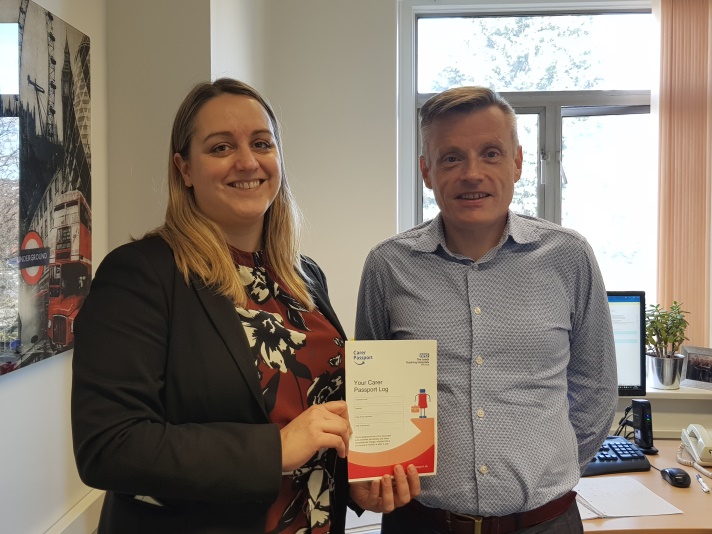In this blog, Sarah Broadhead-Crofts, WYAAT Workforce Programme and West Yorkshire and Harrogate Care Partnership Project Manager, shares her experience of improving working conditions for working carers across West Yorkshire and Harrogate.
The challenge
One in five of staff working for the NHS is balancing working for the NHS and providing unpaid care for a loved one who needs help because of their age, physical or mental illness, disability or alcohol and substance misuse. Juggling work and caring can impact on a person’s health, finances and wellbeing.
The NHS’s greatest strength is its people and we wanted to ensure that working carers felt more supported, valued and listened to. They needed to feel able to discuss their situation and empowered to work with their manager to find solutions that may help. This was a challenge that West Yorkshire Association of Acute Trusts (WYAAT) Workforce Programme and West Yorkshire and Harrogate Care Partnership wanted to address together.
The plan
The six acute trusts in WYAAT have worked closely in a number of projects in the last few years but we wanted to go further - the aim was to help as many working carers in the local area as possible. We wanted to include not just the acute trusts but also the local mental health trusts, community trusts, local councils and clinical commissioning groups (CCGs). To support this, I was recruited as a project manager by WYAAT and West Yorkshire and Harrogate Health and Care Partnership to lead the working carers project. The plan was to focus on hospital trusts first and then move on to local councils and CCGs.
After discussions with local NHS working carers, voluntary caring groups and organisations that were ahead of us in their journey to support their working carers, the project team opted to adopt the “Working Carers Passport” as the primary means to support working carers.
The Working Carers Passport is a conversation, with supported materials, to ensure the right questions are asked, and the appropriate outcomes are put in place to support the working carers.
Evidence shows Working Carers Passports are highly effective; increasing morale and staff retention. Organisations have also reported a reduction in unplanned leave, stress levels and attrition.
All local hospital trusts were invited to join this central project team which would work together to find and then implement possible solutions for working carers. This project team fundamentally believed that there was no need to ‘reinvent the wheel’ many times over, in fact by working collaboratively we were reducing workload and introducing consistency and the equity of the proposed offer for working carers.
We decided on actions and overcame barriers together; we shared best practice, lessons learned and resources. Each trust nominated a representative who worked in the main project team. Ideas were discussed and shared with the representatives trusts to be utilised and implemented locally with resources tweaked with their own local touches.
Successes
All trusts with West Yorkshire and Harrogate are now working tirelessly to support their working carers. Many have implemented the Working Carers Passport and case studies of working carers who have benefited from passports have been really positive. So much so that when NHS England and NHS Improvement heard about our work, they felt that all trusts within England should implement a working carers passport and in June 2020 a national campaign to support NHS working carers was launched off the back of the WYAAT Workforce Programme and West Yorkshire and Harrogate Care Partnership project. The recognition of the importance and impact of this work with working carers was also echoed in the inclusion of a Working Carers Passport in the most recent NHS People Plan.
This is what some of our West Yorkshire and Harrogate health and care colleagues said:
"I am a career to my mum with dementia and also have two teenagers. It’s a very stressful time trying to work full time and having carer responsibilities. The passport has given me and my manager an opportunity to have a good discussion about my responsibilities and needs and what can be put in place to support me and the service."
“The Carers Passport has been useful as it helped me and my manager look at ways to help me without me feeling I was letting the service and colleagues down. I am now working 30 hours a week and my manager will rota me on around appointments when possible so I don’t have to use all my annual leave.”
“I’m a carer for my son who has autism I also work as a midwife. Combining the two is often impossible and I’ve often thought about leaving my job even though I love it. The working carers passport is a godsend. It helped me to really think about where I could do with additional support and then I talked with my manager and we found things that would help. The fixed shifts have really made a difference and me and my son are much happier.”
Final thought
The willingness of NHS organisations to operate with a region-wide view, to collaborate and to openly share resources is truly inspiring. The whole experience has brought everyone closer together with the mutual aim of supporting our working carers. I’m incredibly proud that our Working Carers Project went national – it deserved the recognition it received.
Due to the hard work and dedication of everyone involved in this project, not only have the working carers of West Yorkshire and Harrogate benefited, but the working carers in every trust within England will now have access to valuable support and resources that will help them manage work and unpaid caring and fundamentally stay in work.









